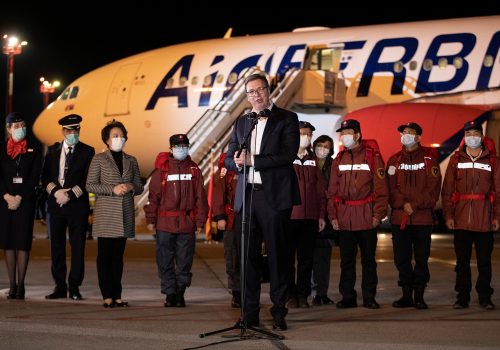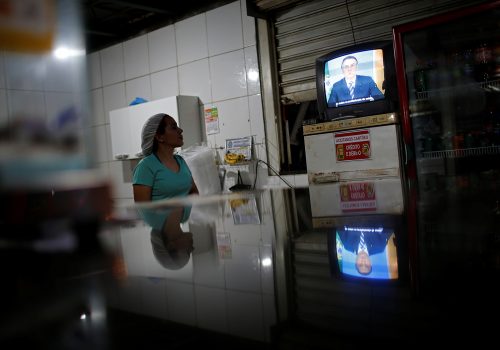CORONAVIRUS ALERT 4/6/2020
The Atlantic Council’s Coronavirus Alert is a regular summary of policy, economic, and business events around the emergency. To stay updated, sign up to the Coronavirus Alert here.
Summary:
The United States faces a “Pearl Harbor” moment this week as parts of the country confront a potential peak in coronavirus cases. As daily death tolls in some European countries show signs of leveling off, debate turns to the thorny problem of how and when to ease restrictions. The UK’s Queen Elizabeth II made a rare address, while Prime Minister Boris Johnson was hospitalized after suffering persistent symptoms of coronavirus.
Statistics:
- There are now approaching 1.3 million cases worldwide in more than 180 countries and territories; more than 70,000 people have died.
QUOTE: “I hope in the years to come everyone will be able to take pride in how they responded to this challenge,” the UK’s Queen Elizabeth II said in a televised address, only the fourth in her sixty-eight-year reign, The Washington Post reported. “We should take comfort that while we may have more still to endure, better days will return.”
HEALTH AND SCIENCE:
- Parts of the United States are approaching the peak in cases of coronavirus, US President Donald J. Trump and his advisers said April 5, The Washington Post reported. Hours earlier US Surgeon General Jerome Adams warned that the week ahead could be a national catastrophe comparable to the 9/11 terrorist attacks or Pearl Harbor, the newspaper said. The death toll in Pennsylvania, Colorado, and Washington, DC is starting to rise, Reuters reported.
- “This is going to be the hardest and the saddest week of most Americans’ lives, quite frankly. This is going to be our Pearl Harbor moment, our 9/11 moment, only it’s not going to be localized,” Adams said on Fox News on April 5, Reuters reported. “It’s going to be happening all over the country. And I want America to understand that.”
- The death toll in the United States is approaching 10,000, but that doesn’t capture the full extent of the epidemic, The New York Times reported, citing public health officials. The number of confirmed cases, at more than 336,000, surpasses those of Italy and Spain, the hardest-hit countries in Europe, the newspaper said. New York remains the epicenter in the United States, with New Jersey about a week behind and the number of cases doubling every two to five days in cities including Los Angeles, Miami, and New Orleans, the Times reported.
- While daily deaths in New York State fell for the first time, Governor Andrew Cuomo cautioned against drawing conclusions too soon, Bloomberg reported. “I see a few signs that are a little hopeful, for sure,” de Blasio said. “I think it’s early to be able to declare” that a corner’s been turned, the newswire cited him as saying.
- New York, and New Jersey to a lesser degree, are still the states with the most confirmed cases of coronavirus, accounting for almost half of the country’s cases and deaths, The Wall Street Journal reported.
- UK Prime Minister Boris Johnson remains in hospital after showing persistent symptoms of coronavirus, the Financial Times reported. He was admitted on April 5 as a precautionary measure to undergo tests, the newspaper said.
- The US government now recommends that Americans wear face coverings but Trump said he won’t be doing that himself, Reuters reported late on April 3. “As I greet presidents, prime ministers, dictators, kings, queens … I don’t see it for myself, I just don’t,” Trump said during his press briefing that day, the newswire reported.
- There are signs that coronavirus cases have started to stabilize in some of the hardest-hit countries in Europe, as daily tolls in Italy, Spain, and France slow, the Financial Times reported. Austria is about to become the first country in Europe to relax lockdown measures, with shops set to reopen as soon as next week, the newspaper said.
- Lockdown measures are still in place elsewhere, CNBC reported. Italy, Germany, and Spain have extended restrictions until April 12, April 19, and April 25, respectively, CNBC said. The UK has said it would review its lockdown after April 12, when it’s estimated the virus could peak there, CNBC reported.
- Coronavirus is a “nightmare scenario” but the death toll in the United States may be lower than some, including Trump, have predicted if people adhere to social distancing directives, billionaire philanthropist Bill Gates told Fox News on April 5, CNBC reported.
- Gates, co-founder of Microsoft, said his foundation will work with seven makers of a possible vaccine, funding the construction of factories to the tune of several billion dollars, The Wall Street Journal reported April 5. “Our early money can accelerate things,” he said, speaking on “The Daily Show with Trevor Noah” on April 2, the newspaper reported.
- India banned all exports of hydroxychloroquine, a malaria drug that Trump often lauds as a “game changer” in combating coronavirus, with immediate effect, Bloomberg reported. In his press briefing on April 4, Trump said he had asked Indian Prime Minister Narendra Modi to honor previous orders of the drug by the United States, a request Modi is giving “serious consideration,” the newswire added.
- Sierra Leone, with a population of 7.5 million, has one ventilator, while the Central African Republic has three for its 5 million citizens. Burkina Faso has eleven ventilators for a population of 19 million, the Financial Times reported. Africa had 8,600 recorded cases of coronavirus and 385 deaths as of April 5, but the disease is tracking the same trajectory as Europe, the newspaper said.
- As Latin American countries increasingly struggle to secure and replenish medical supplies amid global shortages, China is stepping up its global outreach to help combat the virus. While Panama expressed interest in receiving equipment from China, Bolivia, Costa Rica, Mexico, and Peru (announced) have already received equipment and other Chinese donations. Mexico acquired 300 ventilators with help from the Chinese government, for which Foreign Minister Ebrard thanked China. Haiti announced an $18 million agreement to buy medical equipment from China. Argentina joined a video conference in which doctors from Wuhan, China, gave advice and shared their experiences combating the coronavirus. Alibaba founder Jack Ma’s foundation pledged to donate 2 million masks, 400,000 testing kits and 104 ventilators to twenty-four Latin American countries. Cuba claimed that the United States is blocking the arrival of these medical supplies. In tandem, Honduras, Nicaragua, and Paraguay (which do not have formal diplomatic relations with China) have received medical supplies from Taiwan.
- A tiger at the Bronx zoo in New York has tested positive for coronavirus, believed to be infected by a zoo worker who wasn’t showing symptoms, the Associated Press reported. It’s thought to be the first known infection in the United States or of a tiger anywhere, AP said.
QUOTE: “It’s ludicrous that we do not have a national effort” against coronavirus, said Washington Governor Jay Inslee (D), Bloomberg reported.
FINANCE AND ECONOMICS:
- “When, and How, Does the Coronavirus Pandemic End?” Bloomberg published on April 3 in a question and answer format, covering issues including health infrastructure, testing, vaccines, herd immunity, and political systems.
- The United States economy is “going to be an 80 percent economy” until there’s a coronavirus vaccine as before then people will avoid crowded conferences and arenas, said former Food and Drug Administration commissioner Scott Gottlieb, The Washington Post reported.
- Central banks worldwide have freed up about $500 billion of capital so that lenders can keep credit flowing to businesses and households to mitigate the economic impact of coronavirus, the Financial Times reported, citing its own calculations.
- At least one quarter of the US economy has gone idle because of coronavirus, The Wall Street Journal reported, citing research it commissioned from Moody’s Analytics. US daily output has fallen by about 29 percent compared with the first week of March, just before millions of businesses shuttered their activities because of lockdown orders that affect eight out of ten counties, the newspaper said.
- “Emerging economies set to struggle to meet debt obligations,” runs a headline in the Financial Times, citing Capital Economics among others. Capital Economics, a research firm, estimates that economic output will fall by 1.5 percent this year, the first decline drop since 1951, when reliable records began, on lower demand for holidays in Thailand, clothes made in Bangladesh, and auto parts from Mexico, The Wall Street Journal reported.
- Hundreds of US lenders are having trouble accessing the technology platform being used to distribute government rescue loans totaling $349 billion, an amount that’s not enough and will soon get spent, Reuters reported, citing the Independent Community Bankers of America, a top banking group.
- With prices on everything from copper and oil to take-away meals and hotel rooms tumbling, the global economy could fall into deflation territory for the first time in decades, Bloomberg reported. That “could lengthen what may be the deepest recession since the Great Depression” as households hold off making purchases in expectation of even lower prices and companies put off investment, the newswire said.
- “[G]etting to (and sustaining) a happy ending requires dealing with deeper weaknesses that the coronavirus crisis has revealed,” writes the Atlantic Council’s Daniel Fried. “Public health infrastructure turns out to be inadequate; federal strategic reserves of equipment are shallower than need requires; America’s doctors and nurses struggle with shocking inadequacies.”
QUOTE: “Certified recovered people could take up frontline contact positions in medicine and retail to make operations safer. They could work with the elderly and the vulnerable,” Aaron Edlin and Bryce Nesbitt write in the news service Stat. “Just knowing that more and more people have beaten the virus and are back to work would be an immense boost to confidence.”
BUSINESS AND TRAVEL:
- Airbus has told workers that a return to full operations isn’t feasible in the short term as airlines struggle to take delivery of new airplanes and amid parts shortages, Bloomberg reported. The plane maker asked employees to take ten days of vacation between now and mid-May so that the company is able to meet demand later, the newswire said.
- The auto industry in Europe and North America may lose $100 billion in revenue if factories in both regions stay shut until the end of April, the Financial Times reported, citing research group AutoAnalysis.
- BMW, the German luxury automaker, said the trend of plummeting sales seen in the first three months of the year began to reverse in China and South Korea in March as factories started production again, The Wall Street Journal reported. BMW sales in China fell by 30 percent in the first quarter, the newspaper said.
QUOTE:“It’s not just hospitals that need help, but all institutions that care for the frail and infirm,” writes Lionel Laurent, a Bloomberg columnist. “It’s not just the unforgiving nature of the virus that’s being brought to light, but the quality of care the elderly receive.”
RESOURCES
- Johns Hopkins University interactive web-based dashboard to visualize and track reported cases in real-time.
- CDC provides frequent updates and background information on Coronavirus.
- The World Health Organization daily situation reports.
- Harvard Business Review guidance on managing the emergency for corporate decisionmakers.
- The Society for Human Resource Management resources on managing communicable diseases.
- The Wall Street Journal has a useful guide to travel and travel insurance.
- State Department Travel Advisory for China.



